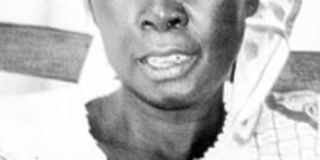Selina Were’s death is yet more music to the ears of Ouko killers

Photo/FILE
Ms Selina Were Ndalo, 68, a maid and a star witness in the inquiry into the murder of the Cabinet minister died last Friday night, January 6 at around 9.30 pm in Ndhiwa District, Homa Bay County.
More than 20 years after Dr Robert Ouko’s charred remains were found, those responsible for his death have more reason to believe that they will not be found any time soon, given the death of a major witness.
Ms Selina Were Ndalo, 68, a maid and a star witness in the inquiry into the murder of the Cabinet minister died last Friday night, January 6 at around 9.30 pm in Ndhiwa District, Homa Bay County.
Her body is lying at the Kosano Hospital Mortuary in Ndhiwa.
Her family refuted claims of the death of the former househelp of the Foreign Affairs minister in the past as rumours.
“My sister moved back to Ndhiwa after her boss died and confided in me that she had been threatened several times by unknown people”, his younger brother Mr Eliud Ndalo told the Nation at the weekend.
The deceased had been ill for quite a while after being bitten by a snake a year ago.
“Her legs were swollen but the doctors could not identify what she was suffering from,” Mr Ndalo added.
Ms Selina Ndalo is believed to be the last person who had a word with the minister at his home before his mysterious disappearance, which is indisputably one of Kenya’s’ greatest unresolved deaths.
Investigations into the minister’s death have only been the very incarnation of great crimes whose committers escape justice for so long, or forever.
Dr Ouko’s charred body was found in February 1990 in Got Alila in Koru and since then, the truth behind his death has been marred by misreporting, bungled investigations, confused testimony, hearsay, rumours and mysterious deaths of witnesses.
Ms Ndalo’s death brings to 18 the total number of witnesses who have died since the inquiry into Ouko’s death began and her demise leaves a major missing jigsaw in the puzzle.
Her recollections detailed what transpired before the minister disappeared from his home.
According to various investigation reports of that fateful night, at about 10pm, Dr Ouko’s sister, Dorothy Randiak had instructed Ms Ndalo to close the minister’s study door, which was still open.
The househelp, with the help of Dr Ouko closed the office that Mrs Randiak said had stacks of files and papers on the desk.
Ms Ndalo, who was responsible for keeping the house keys, also closed the main front door before going to bed at about 11pm.
She told investigators that before closing the front door, she had seen Dr Ouko change into a Kitenge with a red zig zag pattern, trousers, black shoes and a dark brown leather jacket.
But Dr Ouko’s body was found wearing a shirt and jeans, the clothing he was wearing during the evening before changing.
Ms Ndalo told investigators that she saw a white car turning at the bottom of the minister’s driveway in his Koru Farm Complex before driving away.
Ms Ndalo told the Troon investigation team that she “was awakened at about three in the morning by a noise similar to a door being slammed shut’’.
During the Gor Sunguh Parliamentary Committee investigations, 47 people were named as having been involved in Ouko’s murder and cover up.
Selina Were was one of the few remaining witnesses in the mystery. Some of the witnesses who are still alive include Jonah Anguka, the then Nakuru District Commissioner; Zablon Agallo who was an Administration Police officer; Gordon Okoth who was Ouko’s bodyguard; Phillip Rodi Ogutu, who was the gate keeper; Eric Ouko Reru and Onyango K’Oyoo.
Last year in October, the former chief government pathologist Dr Jason Ndaka Kaviti who manufactured the theory that Ouko committed suicide also died after battling a long illness.
He later disowned the suicide theory, which sought to explain that Dr Ouko managed to shoot himself in the head, douse his body with petrol and then set himself ablaze.
Ms Ndalo has not been in the public light since being released from custody in 1991.
Last year, former special branch operative and presidential aspirant Prof George Wajackoyah who alleged that he was forced into exile for “some truths” he discovered during the investigations of the assassination of Robert Ouko, promised the Nation he would tell his side of the story once a case he filed in the UK connected to the murder and Moi’s government is concluded.




